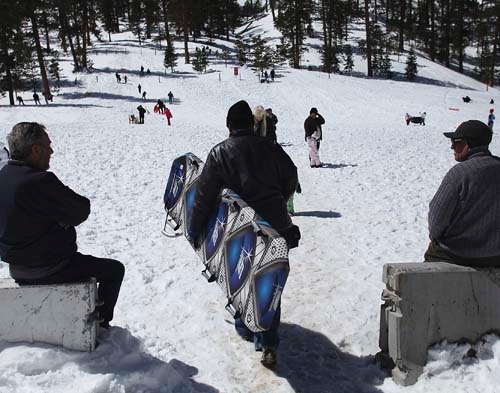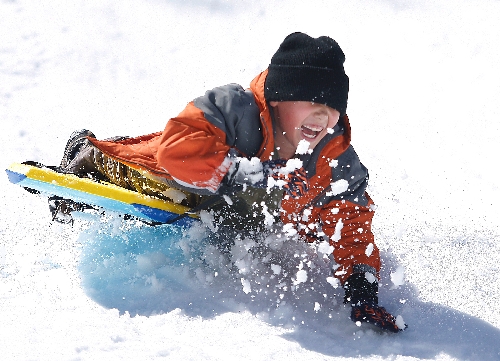Resort wants to upgrade, operate sledding area
CARSON CITY -- Imagine a snow sledding play area managed by snow safety experts.
With permanent restrooms so you don't have to relieve yourself behind some bush or tree.
A warming hut to take the bite out of your icy hands when you just need a little rest from the cold.
A concessions stand so you can easily get something to warm you up or boost your energy level.
And parking for as many as 400 vehicles, so you don't have to worry about motorists striking you or your children as they drive along state Route 156 in Lee Canyon when it gets slippery and dangerous.
That's the vision operators of the Las Vegas Ski & Snowboard Resort have.
And if they can get the Legislature to approve Senate Bill 232, their dream will be one step closer to reality.
But the proposal to create the privately run snow play area on Mount Charleston could run into tough sledding if backers can't soothe concerns from mountain residents fearful it will open the door to new condominiums, casinos and other intrusive projects in the picturesque area.
Backers of the proposal want the Nevada Legislature to lift development restrictions on about 33 acres in Lee Canyon.
The bill by state Sen. John Lee, D-North Las Vegas, and Assemblyman Scott Hammond, R-Las Vegas, seeks to remove land owned by Clark County and the ski resort from the Spring Mountains National Recreation Area.
Doing so would lift development restrictions on the property and pave the way for owners of the ski resort to build a snow play attraction.
WHAT PROPONENTS SAY
Proponents say allowing the ski resort to manage the popular Lee Meadow snow play and sledding area would reduce traumatic accidents on rocky, tree-filled, mountainside terrain and prevent snow-seekers from Las Vegas who overrun the area on weekends from clogging Route 156 with parked cars.
"There are very few trash cans, there are no bathrooms, people just pull up on the side of the road and it is a circus," said Sgt. Eric Fricker of the Mount Charleston substation for the Metropolitan Police Department. "I don't know what they are going to do, but they have to do something. I wouldn't bring my family up here."
Fricker and others who support the bill say making way for a developed, snow play area with ample parking would decrease the number of visitors who park awkwardly along the narrow highway and ride makeshift sleds close to the road.
Those hazards have led to numerous serious injuries and even deaths in the area in recent years.
"When people come up here, they lose their minds. They know they want to play in the snow and they park anywhere," Fricker said. "People get a piece of cardboard or a laundry basket, and they will slide down any hill that is here."
WHAT THE CRITICS SAY
While many on the mountain agree renegade sledders cause unsafe conditions, destroy terrain and contribute to litter, some are skeptical about the solution proposed in SB232.
Skeptics say the bill threatens to reverse gains in 2009 when conservationists rallied behind Assembly Bill 352, a bill that put the development restrictions in place.
"It just sets an absolute terrible precedent for the mountain," said Stephanie Myers, a full-time mountain resident since 1995. "We do not want any more commercial property on the mountain."
Myers also said she doesn't like the idea of turning over public land to a private enterprise.
"The meadow should always belong to the public," she said of the existing snow play area on county land.
If the bill is approved, it would lift development restrictions on five acres of county land and another 28 acres owned by the ski resort. Ski resort managers then would build a parking lot, snow park restrooms and concession stands on the privately owned property.
They also would create and manage a snow play area on the county land with restrooms and a warming hut.
An existing system of shuttle buses would move people between the two tracts as well as the ski resort and nearby hiking and snowshoeing trails.
They could start as early as next winter with picnic tables and trash cans, but parking and a full-fledged snow play area could take years to completely develop, even with temporary structures.
The project still would need to go through the local town board and the Clark County Planning Commission, Las Vegas Ski & Snowboard Resort lobbyist Warren Hardy said.
HOW IT WOULD WORK
Kevin Stickelman, president and general manager of the ski resort, said the company would probably allow people to park in the lot for free and charge admission to use the snow park.
That way people who want to access public hiking trails or use the nearby Foxtail sledding area could do so without paying a fee.
"There would still be plenty of free access in these areas for people who just want to go up and sled," Stickelman said.
The snow play areas would be modeled after similar projects in Utah and California owned by Powdr Corp. of Park City, Utah, one of two companies in the partnership that owns Las Vegas Ski & Snowboard Resort.
Stickelman said the idea is to make enough money with the snow park to pay for improvements and clear the highway leading to the ski resort of traffic congestion caused by uncontrolled parking.
"I'm willing to waive a parking fee to ensure we can get ambulances and fire trucks to the mountain," he said.
Eventually, the ski resort would like to take over management of the Foxtail sledding area as well, he said.
American Land and Leisure, which manages the Foxtail area for the U.S. Forest Service, loses money on Mount Charleston during winter.
Steve Werner, vice president of American Land and Leisure, said Las Vegas Ski & Snowboard is better suited to managing a snow park, because the company already has the insurance, equipment and employees to do the work.
"I don't want to buy a $400,000 snow plow to use for our $10,000 in snow play revenue," Werner said. "There is not enough income in just sledding."
Proponents of the plan don't have much time to make changes to assuage the concerns Myers and others have raised.
The bill could face a hearing on Wednesday where backers are expected to discuss amendments to the bill that will state specifically that casinos, gas stations and other intensive developments won't be allowed.
They admit the first draft of the bill was overly broad and residents were rightly upset.
"We were probably asking people to trust us a little too much," Hardy said.
Contact reporter Benjamin Spillman at
bspillman@reviewjournal.com or 702-477-3861.
Map: Proposed Mount Charleston sled area























